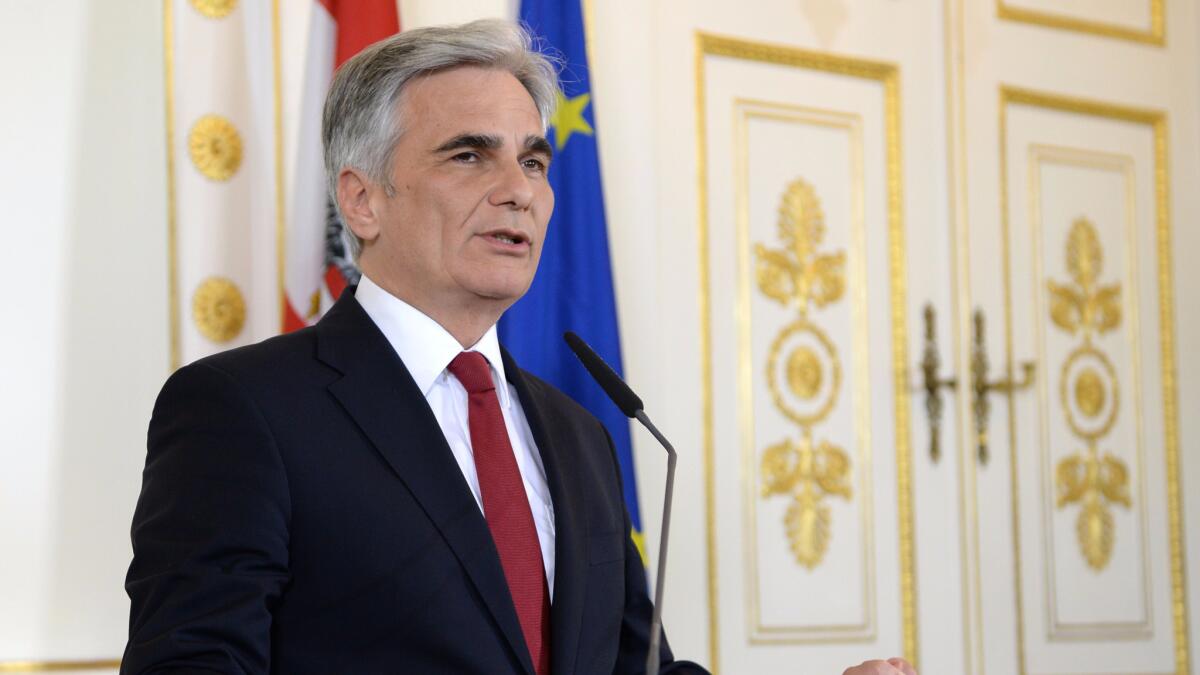Austrian chancellor’s resignation reflects rise of right-wing party, migrant crisis

- Share via
Reporting from Berlin — Austrian Chancellor Werner Faymann abruptly resigned Monday amid intense criticism from his ruling Social Democratic Party and growing support in the country for a right-wing populist party with a strong anti-migrant message.
Faymann, whose party was routed in April 24 elections, told a news conference in Vienna that he was resigning immediately as both chancellor and party leader after more than seven years in power. The move was remarkably hurried in a country famed for its political stability and where successions are usually first lined up long in advance.
Faymann had appeared shaken by the hostile reception he received at a rally May 1 and said Monday he asked himself if he still had the strong backing of his party.
“And I have to answer ‘no’ to that question,” he said. “The government needs a new start with new power. If you don’t have that support, you can’t do the job.”
The Austrian government faced criticism for issues such as unemployment in addition to its handling of the migrant crisis that is challenging countries throughout Europe and the Middle East.
Vienna Mayor Michael Haeupl will take over temporarily as party leader while Vice Chancellor Reinhold Mitterlehner, from the conservative Austrian People’s Party, will take over running the grand coalition government for the time being. Snap elections are possible in the Alpine country that has been one of the main transit nations and destinations for many of the hundreds of thousands of migrants from Syria, Iraq and Afghanistan arriving in Europe in the last year.
Faymann, 56, was under attack for his center-left party’s dramatic fall in recent elections amid a sharp shift to the right in Austria and for his zigzag course on refugees – at first allowing some 90,000 Syrians into the country of 8.5 million but then slamming the door shut in March in a futile attempt to shore up dwindling support that, analysts said, was too little, too late.
“It’s a sign of the increasing nationalism in Europe,” said Thomas Jaeger, a political scientist at Cologne University, of Faymann’s surprise resignation, noting that working-class voters had been abandoning the Social Democrats in droves in Austria over the refugee question. “People think their countries need to close the gates. Faymann at first tried to combat that sentiment and then he did an about-face. That cost him a lot of credibility.”
The country and especially Faymann’s Social Democratic party were still struggling to sift through the wreckage of the first round of the April 24 election for a new Austrian president. Even though the post is ceremonial with limited powers, both the Social Democratic party and its coalition partners were routed, failing to reach the second round for the first time in post-World War II history.
The far-right Freedom Party candidate Norbert Hofer finished first with 35% of the vote. Hofer is favored to win the May 22 runoff election against the second-place finisher, independent candidate Alexander Van der Bellen.
A far-right party in Austria’s northern neighbor, the Alternative for Germany, has also surged to record high levels, winning nearly 25% in a recent state election and getting 15% in national opinion polls. In Denmark, a far-right party’s rise has led the government in Copenhagen to tighten restrictions on migrants.
Kirschbaum is a special correspondent.
More to Read
Sign up for Essential California
The most important California stories and recommendations in your inbox every morning.
You may occasionally receive promotional content from the Los Angeles Times.










